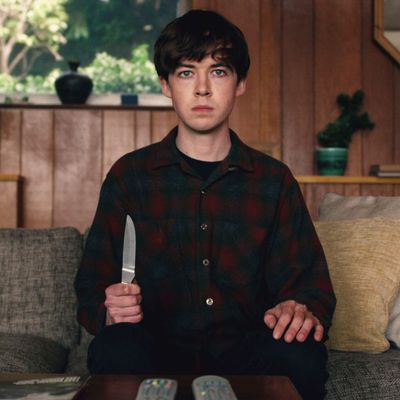
The End of the F***ing World may be based on a 2013 graphic novel by Charles Forsman, but the style and attitude in its eight briskly paced episodes, which originally aired on the U.K.’s Channel Four, strongly suggest they were inspired by early-’90s indie cinema.
“I’m James,” a skinny British kid announces via voice-over in the first scene, as the word “JAMES” splashes across the screen in cockeyed red letters. “I’m 17, and I’m pretty sure I’m a psychopath.”
That’s a Quentin Tarantino-esque moment. So is the one a few seconds later when James — played by Alex Lawther, whom viewers may recognize as the blackmailed teen from the Black Mirror episode “Shut Up and Dance” — walks down a street in slow motion as the melancholy sounds of Bernadette Covell’s “Laughing on the Outside” ooze forth on the soundtrack. In a subsequent episode, Ricky Nelson’s “Lonesome Town” makes a prominent appearance, and it’s impossible to hear the track without assuming it was chosen because it also shows up in Pulp Fiction.
The End of the F***ing World makes blatant efforts to adopt the moody, middle-finger-in-the-air vibe of all kinds of gritty movies; Oliver Stone’s Natural Born Killers also comes strongly to mind. As a result, its first two or three episodes seem overly derivative and too determined to be dark for dark’s sake. It starts out as a show about two messed-up teenagers — James is one, Alyssa (Jessica Barden of Penny Dreadful) is the other — whose frustrating home lives bond them together. They start to maybe fall in love, but first, they decide to take a road trip to escape their awful parental situations. After stealing the car that belongs to James’s dad, Alyssa refuses to buckle up. “Fuck seat belts,” she says, as if this demonstrates the depth of her anti-Establishment streak. More disturbingly, James, who plans to murder Alyssa at some point during their journey, wonders to himself: “I wonder what she would sound like when I killed her.”
But from the fourth episode on, as James and Alyssa find themselves in serious trouble and we learn more about their family backstories, the sensitivity in both characters shines through their hardened façades. It’s as if the teen protagonists — who mention themselves within the context of movies more than once — are so detached that they see themselves as movie characters, but eventually wake up to the fact that there’s more to their lives than empty subversiveness.
Written by Charlie Covell and directed by Jonathan Entwistle, The End of the F***ing World takes more unexpected narrative turns as it goes on, and that makes it worth watching, assuming you can muscle your way through the accompanying gloom and occasional gore. Both Lawther and Barden have a capacity to go from deadpan to deeply agitated in an instant, and those shifts become more compelling the more you watch. Another point in The End of the F***ing World’s favor: No episode is longer than 22 minutes, which means you can fly through the whole series in half an afternoon. Brevity has so much value in an oversaturated binge-watching market.
Like many anti-hero couples before them, James and Alyssa don’t have much respect for authority. But The End of the F***ing World cares enough about them as people to make sure we understand why. We really feel something when their distrust of adults — ranging from their parents to an empathetic cop (Gemma Whelan, a.k.a. Yara Greyjoy from Game of Thrones) — leads to their undoing. Unlike other films and TV shows in the same vein, this is by no means a celebration of criminal behavior. It’s more of a wake-up call about how quickly things can get scary, and how quickly you can lose your sense of self when you act purely on impulse.
The title tells us pretty clearly that this show won’t have a happy ending. But even in its tragic moments, there are still glimmers of loveliness in The End of the F***ing World. You just have to be patient, and watch closely, to fully see them.





